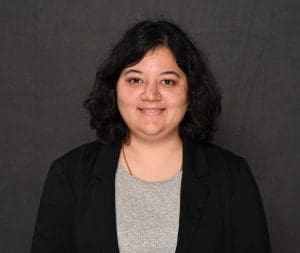 Dr. Shefali Haldar is grateful to be surrounded by support. When she was a child, her family and teachers noticed her interest in science and nurtured her enthusiasm. When she enrolled at Syracuse University’s School of Information Studies in 2010, her professors continued to foster her interest by encouraging her to try advanced classes and undergraduate research opportunities.
Dr. Shefali Haldar is grateful to be surrounded by support. When she was a child, her family and teachers noticed her interest in science and nurtured her enthusiasm. When she enrolled at Syracuse University’s School of Information Studies in 2010, her professors continued to foster her interest by encouraging her to try advanced classes and undergraduate research opportunities.
Since graduating and focusing on her career, she hopes to return the favor by using her love of science to improve the healthcare system – a system that some of her friends and family have struggled with over the years.
“In the span of a few months of my junior year, some close friends and family members ended up in the hospital, and I helped care for them,” said Haldar. “I was confronted with the realities of the healthcare system: fragmented health information, complex decision-making, physical and emotional stress, and difficulty advocating for my loved ones.”
“This experience drove me to do something to improve the healthcare system,” she added. “I wanted to use my problem-solving skills to develop solutions that empowered people.”
Haldar earned a bachelor’s degree from Syracuse in information management and technology and biology in 2014 and her doctorate of philosophy in biomedical and health informatics from the University of Washington in 2019.
While looking into career paths, she found the health informatics field and discovered it was a place where she could achieve that goal and work at the intersection of technology and health.
Now an associate director of platforms and innovation at Merck in the greater Boston area, Haldar leads the research, design and development of technologies that scientists use to conduct studies. Her goal is to understand their challenges and needs and use her research to find technological solutions that can improve their work.
“I’ve had the opportunity to work on solutions across the healthcare industry: hospital systems, government, non-profit organizations, and life sciences,” she said. “In every project, I’m lucky to collaborate closely with people who use and are directly impacted by the technologies I help create: patients, caregivers, providers, and scientists.”
Haldar’s eventual goal is to grow her skills as a leader and mentor. She also wants to help scientists realize their vision for successful and equitable technologies, and to challenge traditional ways of thinking about and solving problems.
Syracuse’s Strong, Supportive Community
When she’s not working, Haldar is busy exploring the Boston area, experimenting with a new recipe or knitting project, or reading a good book. She hopes to continue learning from different experiences, places and people.
“I hope to keep trying new things, travel and rest often, and spend lots of time with my loved ones,” she said.
If Haldar could offer advice to current Syracuse students, she would tell them not to be afraid to ask for help. Also, remember that career paths are rarely linear.
“There is an entire community around you – friends, professors, staff, student organizations – who can be a sounding board for ideas and advice when you need it,” she said. “It can be daunting to take the first step out of school, and to think your choice of what step to take will affect your entire career. But the choice you make now will create new opportunities. You can decide what to do with those opportunities and what direction to go in next.”
Haldar hopes students feel the same support she did at Syracuse, a support system that still sticks with her today.
“I chose Syracuse because I felt it was a strong, supportive community,” she said. “I’m grateful that professors pointed me to opportunities I wouldn’t have otherwise known about, or that I might not have had the confidence to pursue without their encouragement.”
